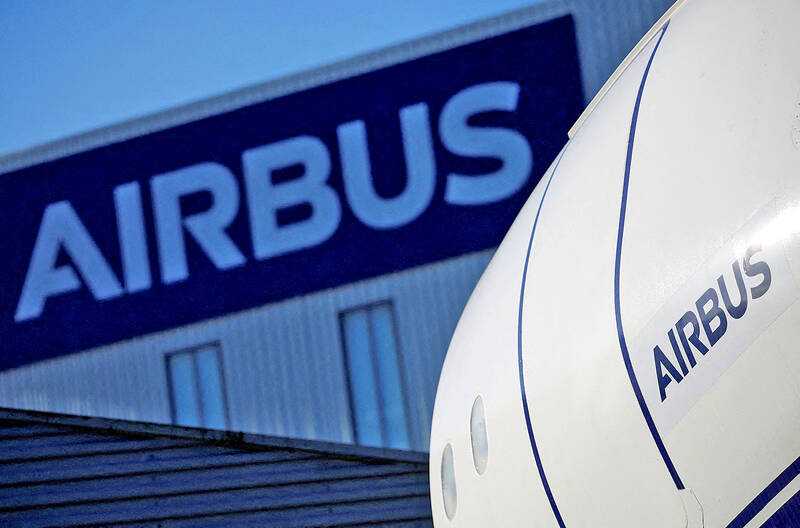Airbus SE is coming up short on the millions of parts that make up the company’s commercial aircraft, and the situation is worsening rather improving for the world’s largest planemaker.
The manufacturer late on Monday said that it is experiencing a shortage on engines, aerostructures and cabin interiors, which in turn is sabotaging the company’s delivery plans.
As a result, Airbus pared back a whole slew of longer-term goals — from operating profit, cash generation and jet handovers to the monthly production rates of its all-important A320 model.

Photo: Reuters
The challenges facing Airbus and rival Boeing Co are caused not by slack demand for its products, but rather a supply chain that has been severely stretched for years. Airbus has long warned of the issue after the COVID-19 pandemic first upended the global aviation industry and then left it unprepared once air travel came roaring back.
What is new is the breadth of the problem, with chief executive officer Guillaume Faury saying that engine shortages are now coming up as the latest pinch point.
“That is a new situation that we were not expecting,” Faury said on a call after Airbus issued its surprise revisions for the year.
The company expects to hand over 770 aircraft rather than 800 units this year. It predicts adjusted earnings before interest and tax to reach 5.5 billion euros (US$5.9 billion) this year, down from a previous goal of as much as 7 billion euros.
The company also cut its outlook for free cash flow before customer financing to about 3.5 billion euros.
Airbus also pushed back its goal to produce 75 of its A320 single-aisle jets per month by one year to 2027. That more conservative approach stands to further intensify a shortfall in new jets, given that Boeing is also making its 737 jets at a significantly reduced monthly rate.
For example, cabin parts are in short supply because airlines are refurbishing older planes, meaning shipments to Airbus are constrained, Faury said.
Many airlines have complained that aircraft deliveries are delayed, forcing them to fly older planes for longer.
The CEO said in an interview earlier this month that any supply issues might persist for the next two to three years.
Faury on Monday said that economic and geopolitical challenges are contributing to the situation and are here to stay “for a while.”
Compounding Airbus’ woes are issues afflicting the engines on its bestselling A320 model, which is powered by RTX Corp’s Pratt & Whitney model or the Leap variant made by the CFM International Inc consortium.
Faury said on the call that the situation has “significantly degraded” in the past few weeks, and that the company would end up with gliders by the end of this quarter — industry parlance for planes without turbines.
Engine issues are becoming more prevalent, after appearing to be more under control last year and beginning of this year, he said.
Airbus would also sustain charges of about 900 million euros related to some space programs, citing “complex and sophisticated products” that created development risks, it said.
As a result, the Toulouse, France-based company would “evaluate all strategic options such as potential restructuring, cooperation models, portfolio review and M&A [mergers and acquisitions] options,” it said.
That review of the troubled space programs is about 70 percent complete, Airbus said on a separate call with analysts.

Application-specific integrated circuit designer Faraday Technology Corp (智原) yesterday said that although revenue this quarter would decline 30 percent from last quarter, it retained its full-year forecast of revenue growth of 100 percent. The company attributed the quarterly drop to a slowdown in customers’ production of chips using Faraday’s advanced packaging technology. The company is still confident about its revenue growth this year, given its strong “design-win” — or the projects it won to help customers design their chips, Faraday president Steve Wang (王國雍) told an online earnings conference. “The design-win this year is better than we expected. We believe we will win

Intel Corp chief executive officer Lip-Bu Tan (陳立武) is expected to meet with Taiwanese suppliers next month in conjunction with the opening of the Computex Taipei trade show, supply chain sources said on Monday. The visit, the first for Tan to Taiwan since assuming his new post last month, would be aimed at enhancing Intel’s ties with suppliers in Taiwan as he attempts to help turn around the struggling US chipmaker, the sources said. Tan is to hold a banquet to celebrate Intel’s 40-year presence in Taiwan before Computex opens on May 20 and invite dozens of Taiwanese suppliers to exchange views

Chizuko Kimura has become the first female sushi chef in the world to win a Michelin star, fulfilling a promise she made to her dying husband to continue his legacy. The 54-year-old Japanese chef regained the Michelin star her late husband, Shunei Kimura, won three years ago for their Sushi Shunei restaurant in Paris. For Shunei Kimura, the star was a dream come true. However, the joy was short-lived. He died from cancer just three months later in June 2022. He was 65. The following year, the restaurant in the heart of Montmartre lost its star rating. Chizuko Kimura insisted that the new star is still down

While China’s leaders use their economic and political might to fight US President Donald Trump’s trade war “to the end,” its army of social media soldiers are embarking on a more humorous campaign online. Trump’s tariff blitz has seen Washington and Beijing impose eye-watering duties on imports from the other, fanning a standoff between the economic superpowers that has sparked global recession fears and sent markets into a tailspin. Trump says his policy is a response to years of being “ripped off” by other countries and aims to bring manufacturing to the US, forcing companies to employ US workers. However, China’s online warriors